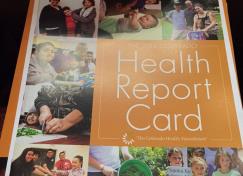
This post was written by Jess Meyer, a former member of our team.
I recently returned to school part time, and am readjusting to having my work regularly evaluated and assigned a letter grade. Being older and wiser now, I’m also aware that while grades have their place in evaluation, they don’t provide much room for nuance or feedback about performance. They’re great for drawing at-a-glance conclusions, but those conclusions are more accurate and useful with the appropriate context. The recent release of the Colorado Health Report Card has reminded me of the importance of reviewing this type of evaluation with a critical eye.
Every year, Colorado receives grades in five age group categories: Healthy Beginnings (C), Healthy Children (C), Healthy Adolescents (B), Healthy Adults (B+) and Healthy Aging (A-). It might be easy to look at these grades and think that Colorado’s adults are healthier than Colorado’s children. Or, that Colorado’s seniors are nearly all very healthy and have good access to health coverage and care. But that’s not what the Report Card is really telling us, and it’s important that we—health care leaders, advocates, journalists, and others—don’t misunderstand its message.
Each grade is based on multiple health indicators as compared to other states. However, each age category uses different indicators appropriate for that age group—obesity and poverty for children, compared to vaccination rates and health-related activity limitations for seniors, amongst others. It would be unfair to compare the letter grades and say that one group is faring better than another, when the grades are based on different indicators and are actually a comparison to how Colorado stacks up against other states.
The real story in the Report Card data lies just below the surface of the letter grades, within each age group. Less than 60% of children who live in poverty engage in regular physical activity compared to 74% of those whose families are middle- to higher- income. Furthermore, adults earning less than $10,000 a year are three times more likely to have diabetes than those making more than $75,000. The Report Card demonstrates similar trends of health disparities across populations due to race and ethnicity; 28% of Hispanic adolescents suffer from depression, compared to 21% of white adolescents, and the rate of mortality for black infants is more than double that of white infants.
Looking at the influence these social factors have on the data, the message is clear: health disparities are holding Colorado back from being a straight-A state. Fortunately, there are a number of ways we as a state can take action. Recently, CCMU published a series of briefs, Action for Equity, which lays out the major health equity issues facing Colorado and outlines concrete action steps we can take to improve the situation. Some of these opportunities can be taken on at a local level, such as engaging parents and families or increasing transportation options, and some are much larger state systems change opportunities, such as increasing data collection and advancing economic opportunity.
Colorado is fortunate to have a number of great health data sources and expert data analysts whose work informs our health systems change efforts. However, this advantage is only useful if we take the time to truly understand the data and then take action accordingly. As a student, it’s important to me that anyone looking at my grades understands what they say—and don’t say—about my academic performance, and I hope that we commit to giving Colorado’s grades the same attention and consideration.




